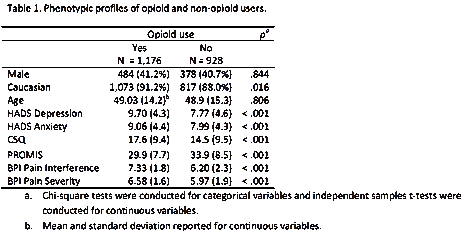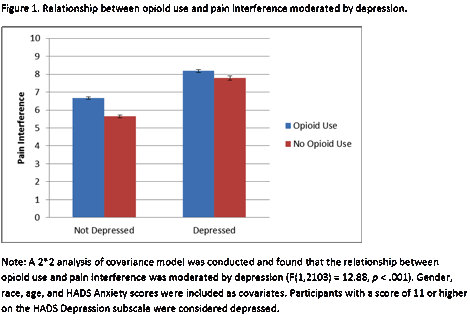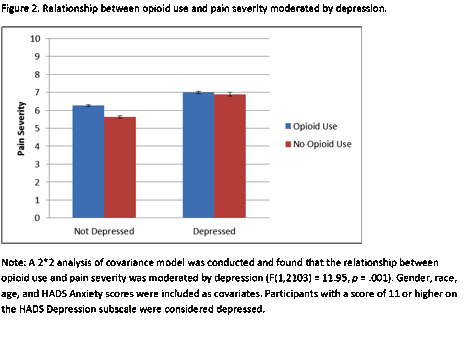Session Information
Session Type: Abstract Submissions (ACR)
Background/Purpose
In the past two decades there has been an increase in the use of opioids to treat chronic pain. Despite this trend, there is little empirical evidence to support the use of long-term opioid therapy in clinical practice. Chronic pain and psychiatric disorders are highly comorbid, yet patients with psychiatric diagnoses are typically excluded from opioid efficacy trials. Clinically, patients with depression and anxiety are more likely to receive opioid therapy. We hypothesized that patients taking opioids would present with a worse clinical phenotype (i.e., more pain, less functioning, and more symptoms of depression and anxiety). We also hypothesized that the relationship between opioid use and pain severity and pain interference would be moderated by depression.
Methods
A total of 2,104 new patients seeking treatment for chronic pain at the University of Michigan’s Back & Pain Center were included. Pain severity and pain interference were measured with the Brief Pain Inventory (BPI), symptoms of depression and anxiety were assessed with the Hospital Anxiety and Depression Scale (HADS), catastrophizing was assessed using the related subscale from the Coping Strategies Questionnaire (CSQ), and physical functioning was assessed using PROMIS SF1. Chi-square, t-tests, and analysis of covariance tests were conducted.
Results
Opioid use was associated with a worse clinical phenotype (Table 1). Depression moderated the relationship between opioid use and pain interference (Figure 1) and pain severity (Figure 2). There was no difference in pain interference by opioid group for depressed patients, but non-depressed opioid users reported more pain interference than non-depressed non-opioid users (p< .001) (Figure 1). The same moderated effect was found for pain severity (p< .001) (Figure 2).
Conclusion
The relationship between opioid use, pain, and depression is complex. Understanding the interaction at a biopsychosocial level is important in order to inform clinical practice. Although causal conclusions cannot be made, this study found patients using opioids present with a worse clinical phenotype. Future longitudinal studies are needed to assess directionality of the relationship and determine whether opioids are the best course of treatment for depressed patients.
Disclosure:
J. Goesling,
None;
M. Henry,
None;
S. Moser,
None;
P. Hilliard,
None;
A. L. Hassett,
Pfizer Inc,
2,
Bristol-Myers Squibb,
2;
C. Brummett,
None.
« Back to 2014 ACR/ARHP Annual Meeting
ACR Meeting Abstracts - https://acrabstracts.org/abstract/an-examination-of-the-interaction-of-opioid-use-pain-and-depression/



